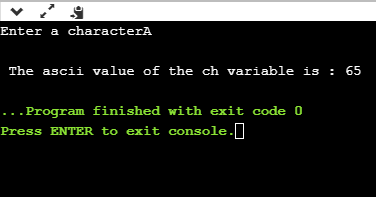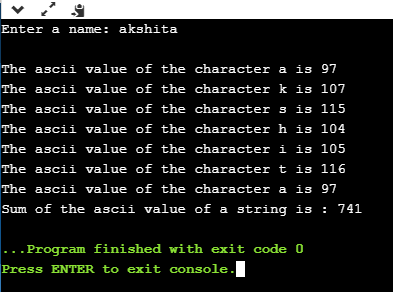ASCII value in CWhat is ASCII code?The full form of ASCII is the American Standard Code for information interchange. It is a character encoding scheme used for electronics communication. Each character or a special character is represented by some ASCII code, and each ascii code occupies 7 bits in memory. In C programming language, a character variable does not contain a character value itself rather the ascii value of the character variable. The ascii value represents the character variable in numbers, and each character variable is assigned with some number range from 0 to 127. For example, the ascii value of 'A' is 65. In the above example, we assign 'A' to the character variable whose ascii value is 65, so 65 will be stored in the character variable rather than 'A'. Let's understand through an example. We will create a program which will display the ascii value of the character variable. In the above code, the first user will give the character input, and the input will get stored in the 'ch' variable. If we print the value of the 'ch' variable by using %c format specifier, then it will display 'A' because we have given the character input as 'A', and if we use the %d format specifier then its ascii value will be displayed, i.e., 65. Output  The above output shows that the user gave the input as 'A', and after giving input, the ascii value of 'A' will get printed, i.e., 65. Now, we will create a program which will display the ascii value of all the characters. The above program will display the ascii value of all the characters. As we know that ascii value of all the characters starts from 0 and ends at 255, so we iterate the for loop from 0 to 255. Now we will create the program which will sum the ascii value of a string. In the above code, we are taking user input as a string. After taking user input, we execute the while loop which adds the ascii value of all the characters of a string and stores it in a 'sum' variable. Output  Next TopicConstants in C |

We provides tutorials and interview questions of all technology like java tutorial, android, java frameworks
G-13, 2nd Floor, Sec-3, Noida, UP, 201301, India












